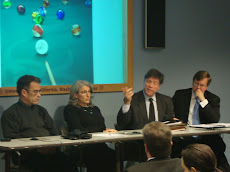...how, during the development of a vaccine targeted against a disease as mild as the H1N1 flu, the recording of no fewer than seven deaths in about 2000 healthy persons receiving Pandemrix as a test drug was regarded as acceptable?...Scroll down to the last (2 July 2010) letter on this BMJ page for the full text.
In 1997, in a widely circulated French journal [3], a Beecham’s business manager claimed: “We started increasing the awareness of the European Experts of the World Health Organization about hepatitis B in 1988 [emphasis added]. From then to 1991, we financed epidemiological studies on the subject to create a scientific consensus about hepatitis being a major public health problem. We were successful because in 1991, WHO published new recommendations about hepatitis B vaccination.” This speaks of exactly the same process as that which was uncovered by the BMJ/The Bureau of Investigative Journalism’s inquiry, namely: 1. WHO’s experts seem to need manufacturers’ salesmen to become “aware” of significant health problems; 2. recognition of “a major public health problem” involves commissioning epidemiological studies whose conclusions are apparently predetermined (“we financed epidemiological studies on the subject to create a scientific consensus”); 3. “new recommendations” are the main medium by which such commercial manipulations are effected, the long-term accuracy of which may be measured by the contrast between the initial skepticism of the BMA [4] and the views it expressed on the topic subsequently [5].
The 2009 EMEA report of the Pandemrix safety and efficacy trials can be reviewed to investigate what was known of vaccine safety last year, but most of the data came from a "mock-up" H5N1 vaccine previously tested, not from H1N1 vaccine. Seven subjects died during the trials: two in the group aged 18-60 and five in the group aged 61 and over. One trial recorded post-vaccination fatigue in 50-60% of subjects and muscle aches in over 60%. Very little information is provided regarding serious adverse events, except that most were thought by investigators to be unrelated to the vaccine. However, when you are conducting trials in order to determine, in part, what the safety issues are for a new vaccine, you cannot dismiss any safety findings until you can compare the incidence of adverse events in cases and controls. To do so during initial drug/vaccine studies is junk science (or unsupported opinion).










No comments:
Post a Comment